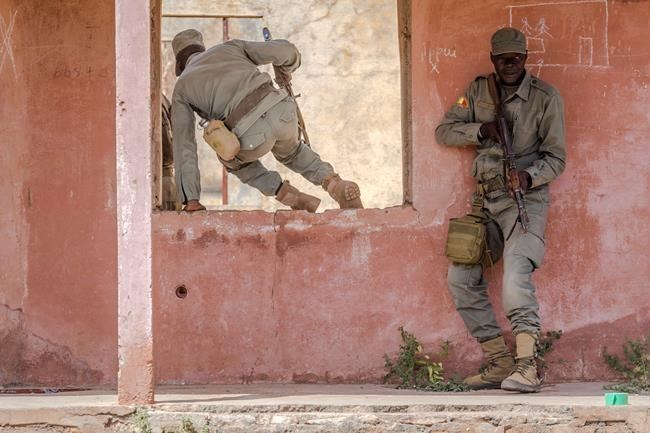
Malinese recruits practise at the European Union Training Mission (EUTM) camp during a visit of Belgium's Prime Minister Charles Michel and Luxemburg's Prime Minister Xavier Bettel, in Koulikoro, Mali, Tuesday, Nov. 28, 2017. The two leaders are in Mali to promote security and development cooperation on their way to an EU-Africa summit in Abidjan. (AP Photo/Geert Vanden Wijngaert)
Republished November 28, 2017 - 4:44 PM
Original Publication Date November 28, 2017 - 9:46 AM
KOULIKORO, Mali - Belgian Prime Minister Charles Michel urged his European Union counterparts on Tuesday to work more closely with Africa on tackling shared migration and security challenges at the root by helping African people improve their lives.
On a stopover in Mali on his way to an EU-Africa summit in the Ivory Coast, Michel told The Associated Press that by investing in development aid and helping to provide security in Africa "we are also working for development and security in Europe."
Michel believes that he and the younger generation of European leaders like French President Emmanuel Macron and Luxembourg Prime Minister Xavier Bettel, who were travelling with him to the summit, have an opportunity to put Africa-EU relations on a new footing.
"I come from a generation that sees Africa as a partner," Michel said. "There is no more room in our generation for nostalgia about the past or a sense of guilt. What counts for us is the capacity to be efficient, pragmatic, in a win-win strategy that serves our mutual interests."
One of those challenges the EU wants to face is migration.
Each year, tens of thousands of Africans travel north through conflict-torn Libya hoping to find better lives in Europe. Around 3,000 die or go missing annually in desperate attempts to cross the Mediterranean in unseaworthy boats.
To dissuade people from leaving, the EU has been sealing agreements with Libya's neighbours, pouring money and security and border control know-how into some of the poorest countries on the African continent hoping to cut the migrant flow off at its source.
Niger has been a success story. But as the borders tighten there, poor and conflict-wracked Mali has become an attractive secondary route for those desperate enough to risk their lives crossing the deserts of Algeria to the coast there or in Tunisia next door.
"We know that Mali and the entire Sahel region is an open door to the European Union," Michel said during a visit to an EU-run training facility for Malian soldiers in Koulikoro, some 60 kilometres (35 miles) northeast of the capital of Bamako.
But tackling migration with these countries is a sensitive task. Few migrants from Mali are keen to return, and the government is happy to welcome the significant sums of money sent into the country by Malians living abroad.
As in much of Africa, Mali's population is set to explode. Forecasts suggest it will grow from around 17 million now to more than 40 million by 2050, meaning the migratory pressures are unlikely to ease soon without significant help.
Beyond population growth, and the impact of climate change, Mali has been wracked by an Islamic insurgency for five years. Four U.N. peacekeepers and a Malian soldier were killed and 21 others injured in two attacks on peacekeepers near the Niger border last week.
"We have seen that no country can escape the dangers of international terrorism," Michel said after he and Bettel watched Mali army recruits using old Russian-made weapons going through their paces in a house-clearing exercise.
"We need to work together in Europe, to share information among our intelligence services," Michel said. "But we also need to attack a number of sources that are the starting point for attacks that destabilize this entire region. We have to stand alongside the people of Mali."
News from © The Associated Press, 2017